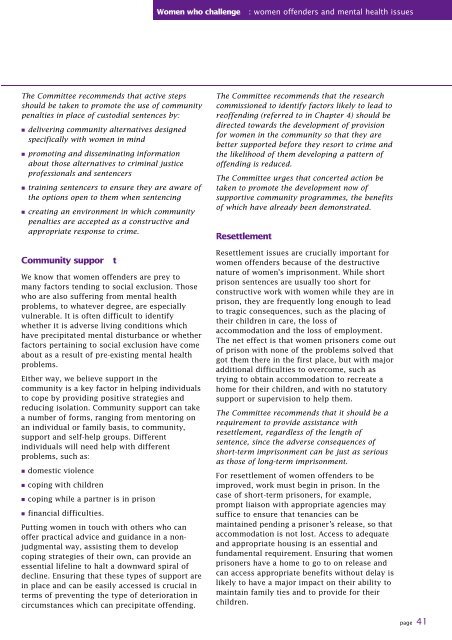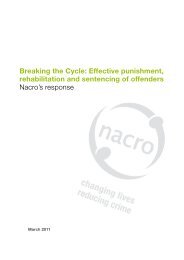Women who challenge - Nacro
Women who challenge - Nacro
Women who challenge - Nacro
- No tags were found...
Create successful ePaper yourself
Turn your PDF publications into a flip-book with our unique Google optimized e-Paper software.
<strong>Women</strong> <strong>who</strong> <strong>challenge</strong>: women offenders and mental health issuesThe Committee recommends that active stepsshould be taken to promote the use of communitypenalties in place of custodial sentences by:• delivering community alternatives designedspecifically with women in mind• promoting and disseminating informationabout those alternatives to criminal justiceprofessionals and sentencers• training sentencers to ensure they are aware ofthe options open to them when sentencing• creating an environment in which communitypenalties are accepted as a constructive andappropriate response to crime.Community supporWe know that women offenders are prey tomany factors tending to social exclusion. Those<strong>who</strong> are also suffering from mental healthproblems, to whatever degree, are especiallyvulnerable. It is often difficult to identifywhether it is adverse living conditions whichhave precipitated mental disturbance or whetherfactors pertaining to social exclusion have comeabout as a result of pre-existing mental healthproblems.Either way, we believe support in thecommunity is a key factor in helping individualsto cope by providing positive strategies andreducing isolation. Community support can takea number of forms, ranging from mentoring onan individual or family basis, to community,support and self-help groups. Differentindividuals will need help with differentproblems, such as:• domestic violence• coping with children• coping while a partner is in prison• financial difficulties.Putting women in touch with others <strong>who</strong> canoffer practical advice and guidance in a nonjudgmentalway, assisting them to developcoping strategies of their own, can provide anessential lifeline to halt a downward spiral ofdecline. Ensuring that these types of support arein place and can be easily accessed is crucial interms of preventing the type of deterioration incircumstances which can precipitate offending.tThe Committee recommends that the researchcommissioned to identify factors likely to lead toreoffending (referred to in Chapter 4) should bedirected towards the development of provisionfor women in the community so that they arebetter supported before they resort to crime andthe likelihood of them developing a pattern ofoffending is reduced.The Committee urges that concerted action betaken to promote the development now ofsupportive community programmes, the benefitsof which have already been demonstrated.ResettlementResettlement issues are crucially important forwomen offenders because of the destructivenature of women’s imprisonment. While shortprison sentences are usually too short forconstructive work with women while they are inprison, they are frequently long enough to leadto tragic consequences, such as the placing oftheir children in care, the loss ofaccommodation and the loss of employment.The net effect is that women prisoners come outof prison with none of the problems solved thatgot them there in the first place, but with majoradditional difficulties to overcome, such astrying to obtain accommodation to recreate ahome for their children, and with no statutorysupport or supervision to help them.The Committee recommends that it should be arequirement to provide assistance withresettlement, regardless of the length ofsentence, since the adverse consequences ofshort-term imprisonment can be just as seriousas those of long-term imprisonment.For resettlement of women offenders to beimproved, work must begin in prison. In thecase of short-term prisoners, for example,prompt liaison with appropriate agencies maysuffice to ensure that tenancies can bemaintained pending a prisoner’s release, so thataccommodation is not lost. Access to adequateand appropriate housing is an essential andfundamental requirement. Ensuring that womenprisoners have a home to go to on release andcan access appropriate benefits without delay islikely to have a major impact on their ability tomaintain family ties and to provide for theirchildren.page 41
















